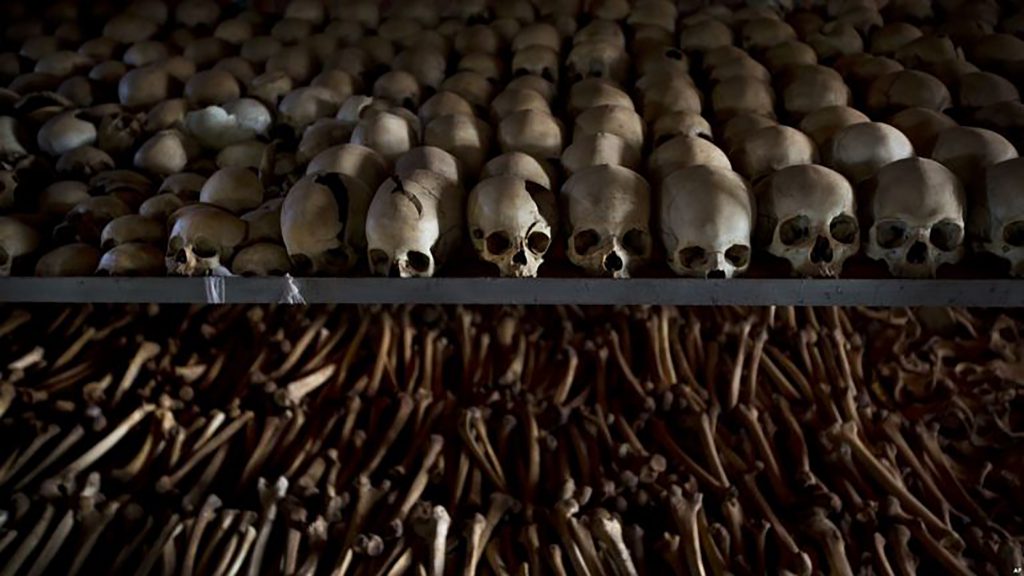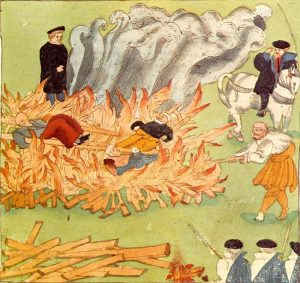In Rwanda there are two ethic groups: the Hutu, which makes up the majority of the population, and the Tutsi, the minority. Tensions between these two groups have been going on for years, so was not surprising that their conflicts would eventually escalate drastically. Despite their differences, they were actually very similar. The two groups have shared the same locations as to where they choose to live, the traditions they follow, and also the language that they speak. At a glance, they look very similar; but Tutsis tend to be taller and slimmer than the Hutus.

Hutu dislike for the Tutsi came about when the Belgians, who once dominated the region of Rwanda, considered the Tutsis to be superior to the Hutus. The Belgians gave the Tutsis better education, and even granted them better jobs than the Hutus. In 1959, a series of riots broke out in Rwanda. Many fled to Burundi, Tanzania, and also to Uganda.1 Unfortunately, 20,000 Tutsis were killed during the riots. In 1962, Belgium relinquished its power over Rwanda, and it was given its independence. The second President of Rwanda, Juvenal Habyarimana, who had been a dictator in power since 1973, and who was also a Hutu, began to lose popularity when the Hutus took over the government and the economy weakened. This is when Paul Kagame, a Tutsi, founded the Rwandan Patriotic Front (RPF) to try and overthrow the president. After much violence, the two sides, the RPF and Habyarimana, signed a peace accord in mid-1993. But on April 6, 1994, the President’s plane was shot down, killing both Habyarimana and the President of Burundi, Cyprien Ntaryamira; and things started to go badly wrong in Rwanda.
After the plane was shot down, the preexisting tensions between the Hutus and the Tutsis quickly flared up. No one knows who shot the plane down, but the Hutus quickly pointed the finger at the Tutsis. Conflict between the two neighboring tribes was nothing new in the central African nation of Rwanda, but the downing of the president’s plane was the final straw for the Hutus. Paul Kagame was accused by the leaderless Hutu government for being responsible for the plane crash and death of Habyarimana.2 Kagame denied this accusation and said that he had nothing to do with it, but news of the death of President Habyarimana spread across the country.
Shortly after the start of Rwanda’s genocide, Rwanda’s government initiated a campaign of retribution, and began to target Tutsis. In just hours, recruits from Hutu groups, government soldiers, and militias were sent to kill the Titus population, a Tutsi-minority tribe living in Rwanda. They were given radios to help them coordinate target groups of people. The recruits were sent into Tutsi cities where they started killing any Tutsi in sight with automatic weapons. For over the one-hundred days, more and more Hutus joined the killing squads, either by force of the government or voluntarily. They started to use machetes, spears, knives, and also masu, which is a thick club with nails sticking out of it. It even got to the point where everyday objects were used.3 They would have screwdrivers, bicycle handle bars, and hammers in one hand, and in the other a radio waiting to hear their next directive. They blew up churches where the Tutsi people were going into hiding to protect themselves, but the churches turned into death sites, trapping those inside when the churches were set on fire. Citizens of the Hutus were even being forced to go and kill the Tutsi people. They were given offers of food and money, and even told that could take the land of a Hutu if they killed them.

American President Bill Clinton did little to stop the massacre, even ignoring the obvious warnings about the killing that would take place after Habyarimana’s plane had crashed.4 Even other countries, like France and Belgium, along with the United States and the United Nations, knew what was about to occur, and wouldn’t take the initiative to try to stop it. For weeks these countries refused to use their moral and political authority to go against the genocidal government of Rwanda. The United States could have done much more to help out a country that was in need. Even a little bit of help would have been something, and maybe a significant number of people wouldn’t have lost their lives. While the American Congress was looking to the President to take action, Clinton was looking to the United Nations to take action. Since nothing was being done, sadly the killing just continued.
The only reason the genocide in Rwanda ended was because of the determination of the RPF. They fought back against the killing squads, and defeated the government’s soldiers. When they took control, Paul Kagame became the Vice President and Minister of Defense. With everything said and done, 800,000 Tutsi men, women, and children were killed from roughly 200,000 participants.5 There were 75,000 children that became orphans. Between 250,000 and 500,000 Tutsi women were raped, resulting in around 20,000 children being born as a result. The HIV virus and AIDS were used as another weapon, with 67% of the women that were raped being infected. If someone would have stepped up before this all unfolded, this would have been prevented and so many people wouldn’t have lost their lives or experience life changing events.
- Samantha Power, A Problem From Hell (New York: Basic Books, 2002) 342-347. ↵
- Samantha Power, A Problem From Hell (New York: Basic Books, 2002) 335-339. ↵
- Encyclopedia of Political Communication, 2008, s.v. “Rwanda Genocide, Role of Media,” by Frank Wittmann. ↵
- Samantha Power, A Problem From Hell (New York: Basic Books, 2002) 353-361. ↵
- Anna-Marie de Beer and Elisabeth Snyman, “Shadows of life, death and survival in the aftermath of the Rwandan Genocide,” Tydskrif vir Letterkunde vol. 52 issue 1 (Autumn 2015): 18. ↵



75 comments
Michelle Falcon
This is something or rather an event I have never heard of before. So many deaths and so much lose came from the leading up to and during the event, it’s heart breaking. This article showed us as readers what exactly happened and how it caused an affect on so many lives. This was a terrible tragedy and will forever have a part in history. I believe this was a very eye opening article.
Liam Gillooly
The tragic tale of the Rwandan genocide is criminally under represented in our school system. I have met several wonderful speakers who suffered at the hands of the tribal conflict, and lived to tell the tale. Priests, doctors and even elected officials were quick to sell out Tutsi refugees. The fact that our own country did nothing to stop this bloodshed is tragic. I am greatly saddened that the Tutsi and Hutu people were not able to peacefully settle their conflicts. Thank you for teaching others about such a sad blunder of history.
Mario Sosa
I do not think there is anything much worse than realizing that the Rwanda genocide could have easily been dramatically minimized or could have never happened had the other nations – the U.S. included – stepped in to prevent it. The least we can do now is to learn from our mistakes and make sure nothing like this ever happens again. Very informative article, excellent job.
Alexandria Martinez
This is a truly tragic story, it almost feels wrong to even call it a story because these are real, horrible events that happened not even too long ago. To think that people are capable of this type of violence, in the same nation is truly scary and horrible. While it is true that the government could have stepped up and tried to help out, it might not have been enough to prevent what was happening, especially because the Hutus were furious about the President being killed.
Megan Barnett
Both the title and featured image really captured my attention as I noticed the year in the title was not that long ago and the caption on the picture stated “some”, as in there were more deaths than shown which I found extremely shocking. Explaining the two separate groups from the start was very helpful and understandable. It is crazy to think that other countries did not do anything to stop the genocide in Rwanda, but surprising that the Tutsi were able to fight back as you do not hear that happening very often.
Jasmine Martinez
This was such an interesting and informative article. It’s so sad to see how others countries stood by and did nothing to help the unprepared people against the trained soldiers. I had never heard of this ever, and this article had a lot of sad but informative facts. I feel as if this could’ve been avoided in so many ways, but it wasn’t, again great article!
Samman Tyata
Very interesting article! Well, I had no any prior knowledge about the context before reading this article. Your article was really informative. I think it’s upsetting how people can think that it is okay to send troops to kill innocent people who have no chance in fighting back. Moreover, it is sad to know that this type of genocide could still happen in such current times. To sum it up, it was a good read.
Erik Shannon
This is a very good article. I have allot of previous knowledge on the Rwanda Genocide. It’s sad that all of these civilians were killed in rigorous ways. There was no way possible that this could’ve been prevented. All the civilians feared for their lives and had no safety to hide behind. Overall, this is a very good and well written article.
Ryann Cervantes
A sad story about racism despite the two groups being quite alike and sharing a lot. It is scary to think about how this could happen due to the minorities lack of defense and the power the majority had. I wonder if the Tutsis indeed did shoot down the plane, and if whoever did could have even imagined the amount of retaliation that was to come because of it.
Ernie Sano
The article is a reminder of the flaws that exist within humanity. Tragedies such as this should never be forgotten and further elaborated on as the subject is one that will likely never perish for as long as humanity exists. All that is to be done is to remind ourselves that people should work to become communally better, and articles such as this help to achieve this goal by showing that these events are in the past, but still exist in our minds today as the negative aspects of mankind.